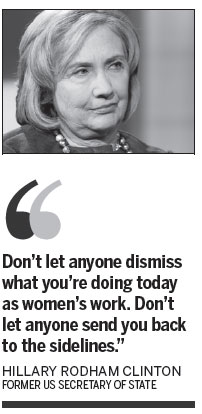Hillary Clinton vies for women's vote as 2016 looms
Hillary Rodham Clinton's 2008 presidential campaign emphasized her experience, competence and preparation to become president. Her 2016 pitch could be simpler: She'd be the first female president.
As Clinton considers a second White House bid in 2016, she is making a pronounced case for female empowerment and the role of women in the nation's economy and politics. From the stage of the annual Clinton Global Initiative to the campaign trail, the former US secretary of state has emphasized breaking barriers and the need for female leadership - themes that could resonate in a future campaign in which women voters will be critical.
"Don't let anyone dismiss what you're doing today as women's work," Clinton told a women's leadership forum last week at the Democratic National Committee. "Don't let anyone send you back to the sidelines."
Along with her husband, former US president Bill Clinton, the former first lady spent last week highlighting the role of female leaders at their family's annual conference. The ex-president spoke to Chilean President Michelle Bachelet about the challenges female leaders face. Other panels featured General Motors CEO Mary Barra and IBM CEO Ginni Rometty, the first female heads of their respective companies.
Hillary Clinton is raising money for Democratic women running in the 2014 elections and is expected to campaign for Democrats in the coming weeks. In Iowa, she praised Democratic congressional candidate Staci Appel, noting that the early presidential state has never elected a woman to Congress or governor.
During her DNC speech last week, Clinton rattled off the names of 10 Democratic women whom she said gave her hope, including candidates for governor like Mary Burke of Wisconsin and Wendy Davis of Texas, as well as US senators Mary Landrieu of Louisiana, Kay Hagan of North Carolina and Jeanne Shaheen of New Hampshire.
The former New York senator's remarks frequently touch on a number of policy issues important to women. Clinton called for a "movement" to bring equal pay, access to child care and raising the minimum wage, reminding her audience that two-thirds of US minimum-wage earners are women.
Anytime she is introduced, speakers invariably mention Clinton's 1995 United Nations speech in Beijing, when she declared that "human rights are women's rights and women's rights are human rights."
Her campaign message to women wasn't always so explicit; her advisers were concerned that being a woman could hurt her with male voters.
When Clinton sought the presidency in 2007 and 2008, her team presented her as a strong leader in the mold of the late British prime minister Margaret Thatcher-with the toughness and experience to lead the nation. One of her most memorable television ads involved a 3 am phone call that implied her Democratic primary opponent, then-senator Barack Obama, wasn't ready to respond to a crisis.
But when she ended her campaign amid praise for her tenacity, Clinton gave what might have been a preview of her approach to the gender question, noting she hadn't shattered the White House's glass ceiling, but had left 18 million cracks in it - a reference to the votes shewon in the primaries.

(China Daily 09/25/2014 page11)












